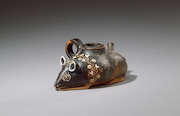Bulletin Board
Classical Employment
Classical Events
Miscellaneous Announcements
Weekly Newsletters
Explorator
The Ancient World on Television (Weekly)
Text Support:

Cartledge: Alexander the Great
Hansen and Nielsen: An Inventory of Archaic and Classical Poleis
Boatwright et al: The Romans. From Village to Empire
Sidebottom: Ancient Warfare. A Very Brief Introduction
Green: From Ikaria to the Stars
Henderson: Hortus. The Roman Book of Gardening
Winkler: Gladiator. Film and History
Barrett: Livia. First Lady of Imperial Rome
|
~ This Day in Ancient History kalendae aprilis
::Friday, April 01, 2005 5:40:13 AM:: |
|
~ Classical Words of the Day Today's selection:
The Classics Technology Center's My Word feature highlights some business terms ...
::Friday, April 01, 2005 5:32:35 AM:: |
|
~ @ the Auctions From Bonham's comes a Gnathian ware "guttus" in the form of a mouse (I know everyone has sat in a course where some prof would describe this sort of thing as "delightful"):
A guttus is a sort of pitcher which is designed to allow the liquid to come out in drops (as opposed to a stream) -- see the article at Lacus Curtius. [note in passing: it looks like a lamp to me]
::Friday, April 01, 2005 5:21:02 AM:: |
|
~ New Courses Knox College highlights some new courses at its institution, of which two are the brainchildren of Classicists:
Bethell's course sounds like something that could be turned into a documentary ...
::Friday, April 01, 2005 5:15:19 AM:: |
|
~ Greek and Roman Holiday From the Garden City Observer:
::Friday, April 01, 2005 5:12:57 AM:: |
|
~ Right to Resist The World Peace Herald cites some ancient precedent in regards to people's 'right to resist tyranny':
::Friday, April 01, 2005 5:11:22 AM:: |
|
~ The State of Classics In anticipation of the Classical Association's annual meeting, the Times ponders the state of Classics:
::Friday, April 01, 2005 5:08:23 AM:: |
|
~ Nomen Omen @ Tradicion Clasica I thought I had suddenly acquired a facility for reading Spanish with incredible fluency ... t'other day, I perused a piece at Tradicion Clasica entitled nomen omen, in Spanish, of course, and had made a note to work through it this weekend. Last night I hit the site again and found it was really easy to read ... of course, the reason is that GL has translated his Spanish version into English! Interesting stuff ... I wonder if the Malventum/Beneventum name change during the war with Pyrrhus works into this (was it renamed before or after?).
::Friday, April 01, 2005 5:00:17 AM:: |
|
~ Mushareff as Coriolanus Redux A while back we mentioned a column in which Pakistan's General Mushareff was compared to Coriolanus ... MH over at CCC has pointed to a followup piece which appeared a few days later (which I didn't catch in my scans) in response, replete with more Classical refs and links to yet another response of sorts, on the subject of rape.
::Friday, April 01, 2005 4:54:01 AM:: |
|
~ Reviews from BMCR Leonora Neville, Authority in Byzantine Provincial Society, 950-1100. Ekaterina V. Haskins, Logos and Power in Isocrates and Aristotle. John K. Papadopoulos, Ceramicus Redivivus. The Early Iron Age Potters' Field in the Area of the Classical Athenian Agora. With a contribution by Michael R. Schilling. Hesperia Supplement 31.
::Friday, April 01, 2005 4:44:42 AM:: |
|
~ AWOTV: On TV Today
DISCC = Discovery Channel (Canada)
::Friday, April 01, 2005 4:42:45 AM:: |
| April 2005 | ||||||
| Sun | Mon | Tue | Wed | Thu | Fri | Sat |
| 1 | 2 | |||||
| 3 | 4 | 5 | 6 | 7 | 8 | 9 |
| 10 | 11 | 12 | 13 | 14 | 15 | 16 |
| 17 | 18 | 19 | 20 | 21 | 22 | 23 |
| 24 | 25 | 26 | 27 | 28 | 29 | 30 |
| Mar May | ||||||
Please help offset our server costs! Your support is greatly appreciated!
BLOGWATCH
About.com
Ancient/Classical History
ARLT
Association for Latin Teaching
Blogographos
Blogging for the Demos
Christian Origins
Kirby's blog and sundry essays about early Christianity
Curculio
The Web Page of Michael Hendry
Campus Mawrtius
Male Graduate Students: Unserious in Terms of Studies Since 1931.
CCC
Classics in Contemporary Culture
Classico e Moderno
L'antichità greca e latina in rapporto alla quotidianità
Hobbyblog
Documenting an ancient coin collection
Hypotyposeis
Sketches in Biblical Studies
Laudator Temporis Acti
Complaints about this and that
Martialis
The Epigrams of Martial
Michael Shanks
rants and ruminations on all things archaeological
NT Gateway
New Testament studies and related material
PaleoJudaica
Ancient Judaism and its context
Philo of Alexandria
Studies of Philo of Alexandria and the Diaspora Judaism of his time
Sauvage Noble
An austronesian's adventures in altertumswissenschaft and indogermanistik
Stoic News
Stoic Philosophy in the 21st Century
The Stoa Consortium
A Blog Without a Tagline
Tradicion Clasica
A Blog dedicated to the Classical Tradition


Fiction:
Pressfield: The Virtues of War. A Novel of Alexander the Great
Saylor: The Judgment of Caesar
Davis: Scandal Takes a Holiday


1. n. an abnormal state or condition resulting from the forced migration from a lengthy Classical education into a profoundly unClassical world; 2. n. a blog about Ancient Greece and Rome compiled by one so afflicted (v. "rogueclassicist"); 3. n. a Classics blog.
Publishing schedule:
Rogueclassicism is updated daily, usually before 7.00 a.m. (Eastern) during the week. Give me a couple of hours to work on my sleep deficit on weekends and holidays, but still expect the page to be updated by 10.00 a.m. at the latest.












